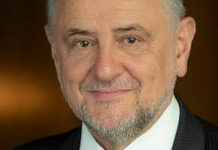When it comes to issues of communal safety and institutional security, congressional testimony by representatives of our community have historically focused on Jewish-centric concerns, like the rise of antisemitism and encouragement for government to do more to protect against it. There is nothing wrong with that; the government’s responsibility to protect its citizenry applies to the Jewish community, just like every other.
But last week, in testimony before the Senate Committee on Homeland Security and Governmental Affairs, Eric Fingerhut, president and CEO of The Jewish Federations of North America, took the opportunity to go beyond parochial needs, as he urged lawmakers to make broader improvements in the security for all faith-based and nonprofit communities against the threats of domestic terrorism and violent extremism.
While highlighting the distressing rise in violent antisemitic incidents, Fingerhut also spoke about ongoing threats to minorities of color and non-Christian worshipers as he built his case.
He reported that the nonprofit community has been part of an “increasingly sophisticated and collaborative public/private partnership” to address security concerns, but lamented that “the growth in need for security assistance has drastically outpaced available resources.” Thus, he argued, “only about 45% of the nearly 3,400 eligible applicants who applied [for security assistance] in fiscal year 2021 were approved and only 45% of the $400 million in total security investments requested were funded.”
Fingerhut, the former CEO of Hillel International, who was once a Democratic congressman from Ohio, had concrete suggestions: First, he called for the designation of the charitable sector as a critical part of the nation’s infrastructure. Currently, there are 16 designated sectors considered so vital to the United States that their incapacitation or destruction would have a debilitating effect on the country. “The charitable sector has not yet received such a designation, and we urge you to give it one,” he said.
Second, he called for a substantial increase in the funding to the Nonprofit Security Grant Program — which at present meets the needs of less than half of the applicants for security funding. Third, he asked for increased access to the Department of Homeland Security’s Cybersecurity and Infrastructure Security Agency’s Protective Security Advisors (PSAs) and Cybersecurity Advisors (CSAs), in order to help make the grant-making process smoother and more widespread, “especially for the benefit of newly eligible suburban and rural communities.”
Finally, he encouraged the enactment of the Pray Safe Act to establish a federal clearinghouse through which faith-based organizations, houses of worship and other nonprofits can access centralized information on best practices for safety and security, available federal-grant programs and training opportunities.
Fingerhut’s broad appeal resonated. He gave the Senate committee four targeted “asks” that would benefit the entire nonprofit sector and provide a nation-wide yardstick by which congressional action can be measured. As Congress refines the meaning of critical infrastructure to be much more than simply roads and bridges, we encourage them to include the enhanced protection of minority communities and nonprofits from extremists and terrorists within our national infrastructure.





